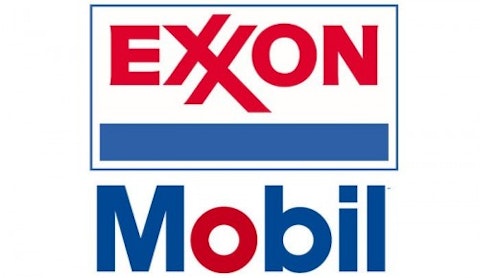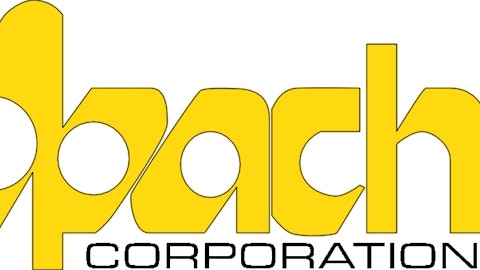According to its 2012 earnings report, Exxon Mobil Corporation (NYSE:XOM) paid $31.045 billion in income taxes in 2012.
That sounds like a lot of money, even for Exxon Mobil Corporation (NYSE:XOM). It sounds like even more money when you consider that, in a recent position paper on why the oil industry is overtaxed and can’t pay any more, the American Petroleum Institute boasted that “America’s oil and natural gas industry already returns more than $86 million to the federal Treasury every day.”
Over the course of 365 days, that works out to $31.4 billion annually, or just a bit more than what Exxon Mobil Corporation (NYSE:XOM) says that it paid in taxes, all on its lonesome. So … does this mean that oil companies Chevron Corporation (NYSE:CVX) and ConocoPhillips (NYSE:COP), refiners Valero Energy Corporation (NYSE:VLO) and Sunoco, natural gas producer Chesapeake Energy Corporation (NYSE:CHK) — that all these members of “America’s oil and natural gas industry,” combined, paid basically no income taxes, and stuck Exxon with the bill?
Or more ominously, does it mean that Exxon Mobil Corporation (NYSE:XOM) is cheating on its taxes?
Actually, neither one. What it means is that when Exxon talks about how much it pays in taxes, and we, its fellow taxpayers, talk about how much Exxon pays the IRS … we’re actually talking about two very different things.
Oil math
Let’s take a quick look at what Exxon Mobil Corporation (NYSE:XOM) says it paid in taxes last year, and where it says the money went — all laid out in its annual report:

What we see here is that indeed, the “total income tax” Exxon incurred last year was $31.045 billion (all these numbers up above are counted in millions of dollars). But digging into the details, you can also see that, for example, $27.5 billion of Exxon’s tax bill — 88.5% — was owed not to the IRS, but to “non-U.S.” tax jurisdictions. Only $3.6 billion of the total bill went to U.S. tax collectors. Of that, only $3 billion was owed to the IRS.
And only $1.9 billion of that was actually currently due to the IRS, with the balance being “deferred” taxes, not yet payable to the IRS.
Which explains how Exxon Mobil Corporation (NYSE:XOM) can completely truthfully say that it paid $31 billion in taxes last year, how it could end up only actually writing the IRS a check for $1.9 billion, and how all of this still jibes with the API’s statement the entire oil industry pays the IRS only about $31.4 billion a year.
So … would you like to know how much Exxon’s rival oil magnates compare to it on income tax liability? Sure you would. And how about a couple of other companies from elsewhere in the oil and gas industry?
Here are the tallies for a few of the other oil-and-gas industry companies named up above — their total income tax liabilities and their tax bills to the IRS.
Chevron
Market cap: $230.9 billion.
Total 2012 income tax liability: $20 billion.
Size of check it cut the IRS: $3.9 billion.
ConocoPhillips
Market cap: $75.6 billion.
Total 2012 income tax liability: $7.9 billion.
The IRS’s cut: $687 million ($63 million current, $624 million deferred).
Valero
Market cap: $18.4 billion.
Total 2012 income tax liability: $1.6 billion.
Of which: $1.3 billion went to the IRS, and only $266 million to foreign tax jurisdictions.
Chesapeake Energy
Market cap: $13.6 billion.
Total 2012 income tax liability: Negative $380 million.
Comprised of: $341 million in tax credits from the IRS, $38 million more from the States, and $1 million from “other.”
Which of these facts and figures surprises you most? That Exxon Mobil Corporation (NYSE:XOM) pays 90% of its taxes to foreign countries? That Valero Energy Corporation (NYSE:VLO) paid twice as much taxes to the IRS as did ConocoPhillips (NYSE:COP) — a company four times its size? Or that Chesapeake Energy Corporation (NYSE:CHK) is incurring no tax liability during the biggest natural gas boom in history? Tell us below.
The article Are Oil Companies Skimping on Their Taxes? originally appeared on Fool.com and is written by Rich Smith.
Fool contributor Rich Smith has no position in any stocks mentioned. The Motley Fool recommends Chevron. The Motley Fool has the following options: Long Jan 2014 $20 Calls on Chesapeake Energy, Long Jan 2014 $30 Calls on Chesapeake Energy, and Short Jan 2014 $15 Puts on Chesapeake Energy.
Copyright © 1995 – 2013 The Motley Fool, LLC. All rights reserved. The Motley Fool has a disclosure policy.





